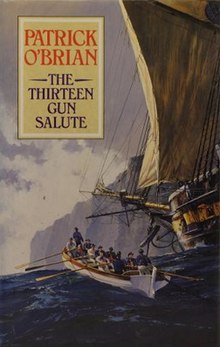 First edition | |
| Author | Patrick O'Brian |
|---|---|
| Cover artist | Geoff Hunt |
| Language | English |
| Series | Aubrey–Maturin series |
| Genre | Historical novel |
| Published | 1989 Collins (UK) |
| Publication place | United Kingdom |
| Media type | Print (Hardback & Paperback) & Audio Book (Compact audio cassette, Compact Disc) |
| Pages | 319 |
| ISBN | 0-00-223460-2 first Collins edition, hardback |
| OCLC | 23692637 |
| 823/.914 20 | |
| LC Class | PR6029.B56 T45 1991 |
| Preceded by | The Letter of Marque |
| Followed by | The Nutmeg of Consolation |
The Thirteen-Gun Salute is the thirteenth historical novel in the Aubrey–Maturin series by Patrick O'Brian, first published in 1989. The story is set during the Napoleonic Wars and the War of 1812.
This novel constitutes the first of a five-novel circumnavigation of the globe; other novels in this voyage include The Nutmeg of Consolation, Clarissa Oakes/The Truelove, The Wine-Dark Sea, and The Commodore.
Spain hears that England may be supporting the independence of its colonies in South America, while an envoy is needed in the Malay states to gain an ally for England. These two changes alter Aubrey's mission from his private man-of-war, Surprise en route to South America. They learn this at Lisbon, where Surprise parts company under Tom Pullings. Aubrey is reinstated on the Navy List in London and gains command of HMS Diane, carrying the envoy to negotiate a treaty with Pulo Prabang and Maturin gains a stay in a naturalist's paradise. Then the Diane is en route to a rendezvous with Surprise, when shoals and a typhoon challenge the Diane and her crew.
Reviews of this novel follow the plot but are more properly reviews of the series to date, as W W Norton began publishing the series of novels in the US. Richard Snow, writing in The New York Times, said they were "the best historical novels ever written."[1] Many in the US took note of his article and sought out the novels. Writing about this novel, comments include that "the ultimate appeal of the Aubrey/Maturin adventures lies in O'Brian's delicious old-fashioned prose"[2] that is "sketching with apparent accuracy and truth the early 19th-century world."[2] Another reviewer finds "There is a recklessness with plot that is intentionally subversive of the genre", while showing "a dazzling receptiveness to language, an understanding of period speech so entire".[3] O'Brian's style has been compared to that of Jane Austen.[4] As to this novel's plot, "the most charming segment is Maturin's idyllic stay in a remote valley, where he blissfully encounters and studies a variety of tame exotic beasts."[4] and "twists of plot are swift, drastic, on occasion comic,"[3] and sometimes grotesque.
- ^ Cite error: The named reference
Snow1991was invoked but never defined (see the help page). - ^ a b Cite error: The named reference
Kirkus1991was invoked but never defined (see the help page). - ^ a b Cite error: The named reference
Flanagan1991was invoked but never defined (see the help page). - ^ a b Cite error: The named reference
PW1991was invoked but never defined (see the help page).